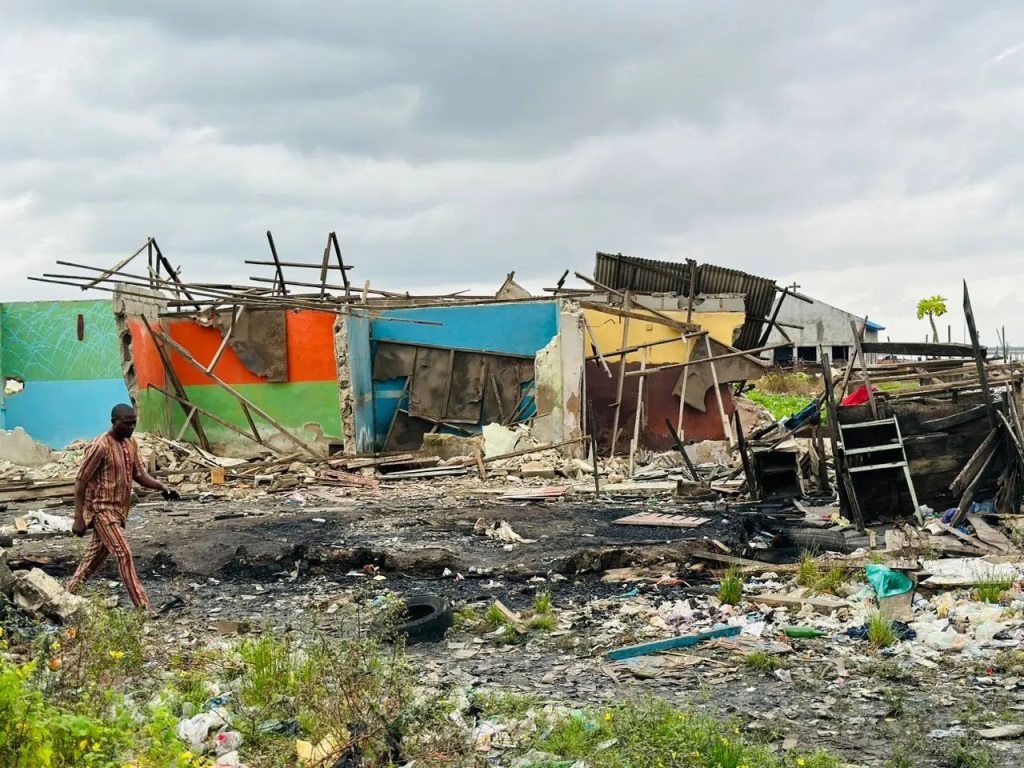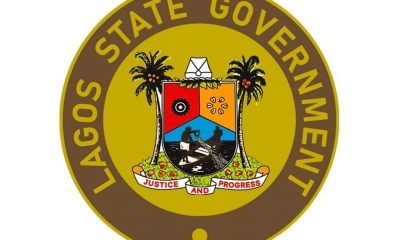Feature/OPED
Forced Evictions and Lagos State Government

By Jerome-Mario Chijioke Utomi
It was in the news recently that residents of the Oworonshoki area in Lagos State on Wednesday, August 2, 2023, protested the ongoing demolition in their area by the Lagos State Task Force, which has seen many residents lose their belongings and homes, left several women and children homeless, and forced many to seek shelter in churches and uncompleted buildings in other areas.
During the protest, which was held at the state House of Assembly complex in Alausa, Ikeja, protesters were seen with placards with inscriptions such as “Say no to land grabbers and wrong demolition”, “Please help us in Oworonshoki “ and “We plead to the government to come to our rescue.”
Even the Lagos State House of Assembly has, a while ago, in a face-saving effort, ordered the State Environmental and Special Offences Enforcement Unit known as Taskforce to stop the demolition and, in its place, set up a five-member ad-hoc committee to investigate the matter and report to the House in two weeks, there are, however, reasons that ring apprehension as to the frequency of this potentially deadly ‘culture’ of demolition/forced eviction in the state and qualify as a reality to worry about, the choice of forced eviction by the state government in its efforts to engineer the development of the state.
Aside from lacking in conventional approaches that infuse human rights principles of participation, accountability, transparency and non-discrimination towards the attainment of equity and justice in such a ‘developmental initiative’, most troubling is the awareness that the present demolition is coming barely two years after a similar thoughtless demolition/forced eviction in July 2021, at the same Oworonshoki was reportedly carried out by the same state government.
Expressly, this piece does not think that what the state government is doing presently in the name of urban renewal/upgrade or regeneration is the best way of turning ‘Slum to Neighbourhood’.
Tragically ‘interesting’ is the awareness that the state has chronically become reputed for achieving urban-related upgrades, renewal and developmental programmes more from a reactionary perspective as against proactive design of effective policies anchored on international best practices.
Take, as an illustration, demolition/forced eviction gained entrance into the state leadership lexicon in July 1990 when Raji Rasaki, in his capacity as Military Governor of Lagos State for yet-to-be-identified reasons, destroyed Maroko. Over 300,000 people that inhabited Maroko then were reportedly affected.
According to reports, Maroko was a sub-city within Lagos. It was peaceful and very popular. The places now called Oniru Royal Estate, some parts of Victoria Island and Lekki Phase 1, were formerly known as Maroko, and it was inhabited by mainly low-income earners. Over 300,000 people inhabited Maroko then. Maroko prided itself on over 150 streets and houses owned by 10,000 landlords. The people were happy people.
Nine years after the Maroko experience, democracy came on board. At each electioneering, intending governors present baskets of manifestos with the promise to make Lagos a more human-friendly, liveable state as the loudest. But contrary to that expectation, documented experience reveals that between 2003 and 2020, demolition/forced evictions of citizens without alternative accommodation characterized every administration in the state.
Beginning with Senator Ahmed Bola Tinubu (May 1999 to 2007, now President of the Federal Republic of Nigeria, to Babatunde Raji Fashola (SAN), 2007 to 2015. From Akinwunmi Ambode (2015 to 2019) and presently Mr Babajide Sanwolu, there was no shift in paradigm as they all stuck to the practice.
The most painful aspect of the narrative is that to achieve this heinous objective; the government has a way of tagging the targeted community as a highly populated urban residential area consisting mostly of closely packed, decrepit housing units in a situation of deteriorated or incomplete infrastructure, inhabited primarily by impoverished persons.
Under the above description/excuse, the following Lagos communities have, between 2003 and 2015, partly or wholly fallen under the bulldozers of the Lagos State Government; Makoko community, Yaba, Ijora East and Ijora Badiya, PURA-NPA Bar Beach, Ikota Housing Estate, Ogudu Ori-Oke, Mosafejo in Oshodi, Agric-Owutu communities, Ageologo-Mile 12, and some communities along Mile 2 Okokomaiko to mention but a few.
As if that was not enough trouble for the poor Lagosians, in 2016, Mr Ambode vowed to evacuate all waterfront shantytowns — a population totalling about 300,000, according to the Nigerian Slum/Informal Settlement Association.
A few months later, 30,000 people lost their homes when one of the slums, Otodo Gbame, a poor fishing community close to the upmarket southeastern district of Lekki, was razed.
During the reported demolition of the Makoko community on July 17, 2012, the British Broadcasting Corporation (BBC) stated that a letter from the Lagos state government was served on residents the previous week, giving them 72 hours to vacate their properties.
The Lagos state authorities further noted in that Letter that the illegal constructions in Makoko constituted an “environmental nuisance, security risk and an impediment to the economic and gainful utilisation of the waterfront” and undermined the “megacity status” of Lagos.
Adding to the woes of the evictees is the government’s ‘love’ for disobeying court directives and non-fulfilment of their promises to resettle those evicted.
As another example, it was reported in the media that at the Supreme Court, Abuja, in the year 2002, the Lagos state government, through the then Lagos State Commissioner for Justice, Professor Yemi Osinbajo, the immediate past Vice President of Nigeria, accepted responsibility for demolishing Maroko community and promised the evictees 1,000 housing units every year, till the whole former house-owners of Maroko are fully resettled.
He admitted that though the government acquired Maroko town in 1972, it again relinquished the acquisition in 1977, thereby confirming that Maroko was not under government acquisition when it was demolished in 1990. But regrettably, to this day, nothing has been done by the state government or its agents to remedy the situation or fulfil the promise made.
The above sad account is an emblem of governments that are unmindful of or deliberately decided to ignore the clarification by the United Nations Independent Expert on the Right to Development, which among other remarks, noted that for a programme to be tagged development, it must require a particular process that allows the realization of economic, social and cultural rights, as well as civil and political rights, and all fundamental freedoms, by expanding the capabilities and choices of the individual.
In a similar vein, the international convention on Economic, Social and Cultural Rights (Ratified by Nigeria in 1993) is one document that probably did more than anything else to capture the gully of disappointments and many sins of successive administrations in the state against the evictees.
It recognized that globally, forced eviction is a brazen violation of the right to life, the right to a fair hearing, the right to dignity of the human person, the right to a private and family life, and the rights to property guaranteed by the constitution of the Federal Republic of Nigeria, and the African charter of Human and peoples’ Right (Ratification and Enforcement Act 1990). Similarly, the United Nations Human Rights Commission Resolutions 1993/77 and 2004/28 affirm that when forced evictions are carried out, they violate a range of internationally recognised human rights.
These include the Human rights to adequate housing, security of the person, security of the home, health, food, water, work/livelihood, education, freedom from cruel, inhuman and degrading treatment, freedom of movement, information, and participation and self-expression.
While it has been reported repeatedly that clearance operations should take place only when conservation arrangements and rehabilitation are not feasible, relocation measures stand made, UN Resolution 2004/28 recognized the provisions on forced evictions contained in the Habitat Agenda of 1996 and recommended that, “All Governments must ensure that any eviction that is otherwise deemed lawful is carried out in a manner that does not violate any of the human rights of those evicted.”
It will be highly rewarding if the state government internalizes these provisions and develops processes or processes that allow the realization of economic and social development of the state in a way that protects the rights of the people.
Broadly speaking, from the above accounts, it is evident that the practice of forced eviction by state actors remains a sad account of or a symbol of, governments that have consciously decided to flagrantly ignore the global framework on physical planning of liveable neighbourhoods, slum upgrade and urban regeneration.
To further buttress this claim, let’s cast a glance at how a ‘famous’ slum challenge was creatively handled in Rio de Janeiro, Brazil, without displacement or eviction of the original occupants.
Instead of removing the favelas, a people initially considered/described as illegal occupants, many of the government’s policies were made to focus more on improving the infrastructure of the people/the area.
The Inter-American Development Bank, for example, funded a $180 million “slum to neighbourhood” project in 1995, which sought to integrate existing favelas into the fabric of the city through infrastructure upgrading and service development.
The project involved 253,000 residents in 73 favela neighbourhoods in Rio de Janeiro. When a favela was selected, a master plan for upgrades was drafted, and community organizations were contacted and asked to provide their input. When the final plan was approved, incentive plans were implemented for hiring construction companies that employed local community workers.
From Brazil to Spain and South Africa, the story and experience are the same.
Comparatively, when one juxtaposes the above accounts as recorded in Brazil with that of July 1990 Maroko’s experience, there exists a gully of difference.
Essentially, aside from the imperative of drawing useful lessons from Brazil’s experience, this piece would also appreciate the Lagos state government explaining whose responsibility it is to provide infrastructures; government or the people/residents?
For me, providing an answer(s) to the above question will redefine as well as address the government’s relationships with the people on issues of physical planning and urban re-generation, usher in eviction-free co-existence while sending new lessons to other states in the country and of course the federal government reputed for practices of forced evictions.
Utomi is the Programme Coordinator (Media and Policy) for Social and Economic Justice Advocacy (SEJA) in Lagos. He can be reached via je*********@***oo.com/08032725374
Feature/OPED
Revived Argungu International Fishing Festival Shines as Access Bank Backs Culture, Tourism Growth

The successful hosting of the 2026 Argungu International Fishing Festival has spotlighted the growing impact of strategic public-private partnerships, with Access Bank and Kebbi State jointly reinforcing efforts to promote cultural heritage, tourism development, and local economic growth following the globally attended celebration in Argungu.
At the grand finale, Special Guest of Honour, Mr Bola Tinubu, praised the festival’s enduring national significance, describing it as a powerful expression of unity, resilience, and peaceful coexistence.
“This festival represents a remarkable history and remains a powerful symbol of unity, resilience, and peaceful coexistence among Nigerians. It reflects the richness of our culture, the strength of our traditions, and the opportunities that lie in harnessing our natural resources for national development. The organisation, security arrangements, and outlook demonstrate what is possible when leadership is purposeful and inclusive.”
State authorities noted that renewed institutional backing has strengthened the festival’s global appeal and positioned it once again as a major tourism and cultural platform capable of attracting international visitors and investors.
“Argungu has always been an iconic international event that drew visitors from across the world. With renewed partnerships and stronger institutional support, we are confident it will return to that global stage and expand opportunities for our people through tourism, culture, and enterprise.”
Speaking on behalf of Access Bank, Executive Director, Commercial Banking Division, Hadiza Ambursa, emphasised the institution’s long-standing commitment to supporting initiatives that preserve heritage and create economic opportunities.
“We actively support cultural development through initiatives like this festival and collaborations such as our partnership with the National Theatre to promote Nigerian arts and heritage. Across states, especially within the public sector space where we do quite a lot, we work with governments on priorities that matter to them. Tourism holds enormous potential, and while we have supported several hotels with expansion financing, we remain open to working with partners interested in developing the sector further.”
Reports from the News Agency of Nigeria indicated that more than 50,000 fishermen entered the historic Matan Fada River during the competition. The overall winner, Abubakar Usman from Maiyama Local Government Area, secured victory with a 59-kilogram catch, earning vehicles donated by Sokoto State and a cash prize. Other top contestants from Argungu and Jega also received vehicles, motorcycles and monetary rewards, including sponsorship support from WACOT Rice Limited.
Recognised by UNESCO as an Intangible Cultural Heritage of Humanity, the festival blends traditional fishing contests with boat regattas, durbar processions, performances, and international competitions, drawing visitors from across Nigeria and beyond.
With the 2026 edition concluded successfully, stakeholders say the strengthened collaboration between government and private-sector partners signals a renewed era for Argungu as a flagship cultural tourism destination capable of driving inclusive growth, preserving tradition, and projecting Nigeria’s heritage on the world stage.
Feature/OPED
$214Bn Missing, Institutions Silent: Is Accountability Dead in Nigeria?

By Blaise Udunze
Between 2010 and 2026, a staggering $214 billion, approximately N300 trillion in public funds, has been reported as missing, unaccounted for, diverted, unrecovered, irregularly spent, or trapped in non-transparent fiscal structures across Nigeria’s public institutions.
That figure is not speculative but a conservative estimate of unaccounted funds. It is drawn from audit reports, legislative probes, civil society litigation, executive directives, and investigative findings spanning more than a decade. If it is to go by the accurate figure, the true national loss is likely higher but difficult to quantify precisely due to data gaps, overlapping figures, and incomplete audits.
The challenge is that in many of the most prominent cases, prosecutions have stalled, hearings have dragged without resolution, investigations have gone cold, and no defining jail terms have etched accountability into Nigeria’s institutional memory. The irony is that the number is historic, the silence is louder. And the economic damage is cumulative.
The pattern stretches from the oil sector to social investment programmes, from the Nigeria Central Bank of Nigeria (CBN) interventions to ministry-level expenditures. In 2014, between $10.8 billion and $20 billion in unremitted oil revenues linked to the Nigerian National Petroleum Corporation triggered national outrage. Under the then CBN governor, Lamido Sanusi, who warned that persistent oil revenue leakages were making exchange rate stability “extremely difficult.” He cautioned that without full remittances, the alternative would be currency devaluation and financial instability. This concern spans the 2010 to 2013 oil revenue period. That warning proved prophetic.
This is because, years later, the lack of transparency in the oil industry did not disappear, but rather it festered like cancer. It further led to the elongated audit queries, which have continued to trail the Nigerian National Petroleum Company Limited, including unremitted revenues, questioned deductions, and management fee structures under the Petroleum Industry Act. With an extraordinary move aimed at blocking revenue leakages at source, President Bola Ahmed Tinubu has recently issued an Executive Order suspending certain deductions and directing direct remittance of taxes, royalties, and profit oil into the Federation Account, which involves the reassessment of NNPC’s 30 per cent management fee and 30 per cent frontier exploration deduction under the Petroleum Industry Act.
Such presidential intervention underscores the scale of concern, which means that Nigeria cannot afford a structural lack of transparency in its most strategic revenue sector. But oil is only one chapter.
The Central Bank of Nigeria has faced some of the most far-reaching audit alarms in recent years. In suit number FHC/ABJ/CS/250/2026, the Socio-Economic Rights and Accountability Project (SERAP) is asking the Federal High Court to compel the CBN to account for N3 trillion in allegedly missing or diverted public funds. The Auditor-General’s 2025 report cited failures to remit over N1.44 trillion in operating surplus to the Consolidated Revenue Fund, over N629 billion paid to “unknown beneficiaries” under the Anchor Borrowers’ Programme, and more than N784 billion in overdue, unrecovered intervention loans.
There were also N125 billion in questioned intervention expenditures, irregular contract variations exceeding N9 billion, and procurement gaps running into hundreds of billions. The Auditor-General repeatedly recommended recovery and remittance. No date has been fixed for the hearing. Meanwhile, Nigeria continues to borrow.
Elsewhere, the House of Representatives has launched a probe into over N30 billion recovered during investigations into the National Social Investment Programme Agency (NSIPA). The funds, reportedly frozen during investigation, have not been remitted back into the Treasury Single Account, stalling poverty-alleviation schemes like TraderMoni and FarmerMoni. Millions of vulnerable Nigerians remain exposed while lawmakers search for money already “recovered.” The irony is staggering as funds are found, but programmes remain frozen.
A top discovery recently that put the nation on red alert was made by the Senate committee, which claimed to have found N210 trillion in financial irregularities in NNPC accounts between 2017 and 2023, including unaccounted receivables and accrued expenses. A critical concern is that, as of early 2026, this has sparked commentary but no clear prosecutions.
Only recently, in the power sector, SERAP has urged the President to probe alleged missing or unaccounted N128 billion at the Federal Ministry of Power and the Nigerian Bulk Electricity Trading Plc. Of concern is that despite the enormous funds channelled in this sector, Nigeria’s chronic electricity instability persists, even as billions meant to stabilise the grid face audit scrutiny.
Across MDAs, audit reports between 2017 and 2022 flagged trillions in unsupported expenditures, unremitted taxes, unauthorised payments, and statutory liabilities never recovered. These sums are dizzying and are also alarming; N300 billion here, N149 billion there, N3.403 trillion across agencies, N30 trillion-plus Treasury discrepancies raised at the Senate level.
Individually, they shock. Collectively, they define a structural pattern. And patterns shape economies.
Nigeria operates with structural fiscal deficits and also lives with them routinely and comfortably. Expenditure persistently exceeds revenue. When public funds disappear, fail to be remitted, or are trapped outside constitutional channels, the deficit widens. The government must borrow to fill gaps created not only by low revenue, but by revenue leakage.
Debt servicing now consumes a disproportionate share of federal revenue. Borrowing meant for capital projects increasingly finances recurrent obligations. The country shifts from borrowing to build to borrowing to survive. Every missing naira compounds tomorrow’s liability.
The Treasury Single Account (TSA) was designed to plug such leakages. It consolidated government revenues under Section 80 of the Constitution into a unified framework. International financial institutions commended it as a landmark reform. Yet even today, the Minister of Finance, Wale Edun, has admitted that substantial government funds remain outside the TSA and outside the CBN’s consolidated visibility. Until August 1, 2024, he revealed, the federal government could not fully see its own balance sheet at the apex bank. That admission should alarm any serious economy.
Fiscal lack of transparency constrains planning. It undermines monetary coordination. It weakens debt sustainability projections. It distorts policy responses. And when systems are in flux, money vanishes more easily.
Changing or weakening the TSA in such an environment would be catastrophic. Transitions create windows of vulnerability. Old accounts close. New accounts open. Reconciliation’s lag. Ghost contractors reappear. Double payments slip through.
Albeit, the government must learn to tread with caution as Nigeria’s institutional bandwidth is already strained by simultaneous tax reforms, exchange-rate adjustments, subsidy removal, and fiscal restructuring. One truth that cannot be argued is that layering additional structural upheaval onto fragile systems risks revenue loss that the country cannot afford. Investors are watching.
Credit markets evaluate not just numbers but institutional consistency. A nation that abandons or weakens its most credible fiscal reform sends a destabilising signal. Stability lowers borrowing costs. Institutional drift raises them. But beyond markets lies the human cost.
N300 trillion represents roads not built, power plants not completed, irrigation systems not funded, schools not modernised, and hospitals not equipped. It represents jobs not created and industries not catalysed. It represents stalled productivity and deferred growth.
When intervention loans remain unrecovered, agricultural output suffers. When power sector funds are unaccounted for, electricity remains unstable. When social investment funds are frozen, poverty deepens.
Inflation then compounds the pain. Revenue gaps push borrowing. Borrowing pressures, interest rates and by extension, liquidity misalignment fuel price instability. Citizens pay through higher food costs, transport fares, and rent. The poor pay first. The middle class erodes quietly.
Perhaps most corrosive is the trust deficit. When audit queries fade without visible accountability, tax morale weakens. Compliance declines. Cynicism hardens. A nation cannot modernise where trust in fiscal integrity is fragile.
Section 15(5) of the Constitution requires the abolition of corrupt practices. Financial Regulations mandate a surcharge and referral to anti-corruption agencies where public officers fail to account for funds. The Fiscal Responsibility Act empowers citizens to enforce compliance to ensure that government officials follow fiscal rules. But enforcement defines seriousness.
Nigeria’s problem is not a lack of audit findings. It is the distance between findings and finality.
Nations do not collapse overnight due to a lack of funds. They drift. Infrastructure decays incrementally. Debt rises gradually. Growth slows subtly. Confidence erodes quietly. Then one day, stagnation feels permanent. $214 billion (N300 trillion), sixteen years of recurring audit alarms. Few conclusive accountability outcomes are proportionate to the scale. Truly, the consequences have been less strong. For the same reason, the country witnessed President Tinubu nominating ex-NIA boss Ayodele Oke as ambassador despite a $43 million loot in an Ikoyi apartment.
See the research breakdown of some of the audit figures that reveal staggering sums as enumerated above:
– $10.8 billion and separately $20 billion in unaccounted oil revenues at the NNPC in 2014
– $1.1 billion controversial Malabu Oil and Gas oil deal in 2015
– $2.2 billion arms procurement irregularities in 2015
– N3.4 billion from IMF COVID-19 financing flagged in a 2020 audit.
– N149.36 billion, N37.2 billion, and multiple irregular MDA expenditures in 2020 alone.
– N300 billion cited in public audit concerns in 2017.
– N210 trillion in financial irregularities uncovered, N103 trillion in ‘accrued expenses’, and another N107 trillion in unaccounted ‘receivables’ (2017 -2023).
– N57 billion Ministry of Humanitarian Affairs – (2021)
– N3 trillion and N1.44 trillion flagged in 2022 audit issues involving the Central Bank of Nigeria.
– Nearly N630 billion under the Anchor Borrowers Programme is reportedly unrecovered.
– N784 billion in overdue intervention loans flagged.
– Over N3.403 trillion unaccounted for across federal MDAs between 2019 and 2021.
– Roughly 30 trillion+ in Treasury Single Account and Consolidated Revenue Fund discrepancies raised at the Senate level.
– N500 billion in unremitted oil revenues between 2019 and 2024.
– N80 billion tied to alleged fictitious contracts in the Accountant-General’s office.
– N69.9 billion in uncollected statutory tax liabilities.
– Billions more in unauthorised or undocumented expenditures across ministries.
The institutions differ. The years differ. The audit language differs. The pattern does not.
Nigeria’s economic future will not be determined solely by how much oil it produces, how many reforms it announces, or how many executive orders it signs. It will be determined by whether every naira earned enters the Federation Account transparently, whether every intervention loan is tracked and recovered, whether every surplus is remitted constitutionally, and whether every diversion carries consequences. Revenue generation matters. Revenue protection is destiny. Because when government funds go missing, nations do not stand still. They move backwards.
Blaise, a journalist and PR professional, writes from Lagos and can be reached via: bl***********@***il.com
Feature/OPED
The Hidden Workforce of the 2026 Access Bank Lagos City Marathon

When the final runner crossed the finish line at the 11th edition of the Access Bank Lagos City Marathon (ABLCM), the applause began to fade. But for hundreds of workers across Lagos, the real work was just beginning.
Major highways had been closed to facilitate the event. Tens of thousands of runners moved through the city in a coordinated surge of athletic endurance. Thousands of bottles of water and energy drinks were distributed, alongside sachets containing essential medical supplies and medication. The race route itself was meticulously prepared, lined with banners, barricades, medical tents and precision timing systems that ensured safety, organisation and accurate performance tracking from start to finish.
What followed was the part that a few cameras lingered on, yet it remains one of the clearest indicators of institutional progress.
Within minutes of the race conclusion, coordinated sanitation teams fanned out across the marathon corridor. Their work went beyond sweeping. Waste was systematically sorted. Plastic bottles were separated from general refuse. Sachets were gathered in bulk. Collection trucks moved along predefined routes, ensuring rapid evacuation of waste. Temporary race infrastructure was dismantled with quiet precision.
In a megacity like Lagos, speed is a necessity. Urban momentum cannot pause for long. The ability to restore order quickly after an event of this magnitude reflects operational discipline across interconnected systems, municipal authorities, environmental agencies, private waste management partners and event coordinators.
Globally, large-scale sporting events are no longer evaluated solely by participation numbers or prize purses. Sustainability has emerged as a defining metric. Environmental responsiveness is now a core measure of credibility. Cities seeking tourism growth, foreign investment and international partnerships must demonstrate that scale does not compromise responsibility. The 2026 marathon provided a compelling case study in this evolution.
The clean-up operation itself generated meaningful economic activity. Temporary employment opportunities emerged for sanitation workers and logistics personnel. Recycling partners engaged in material recovery, reinforcing circular economy value chains. What was once viewed as routine waste disposal has evolved into a structured ecosystem of environmental services, a sector of increasing importance in modern urban economies.
This level of sustainability was the result of deliberate planning. Effective post-event recovery requires route mapping, waste volume projections, coordination between sponsors such as Access Bank Plc and municipal bodies, contingency planning for congestion points and clear communication protocols.
Each edition of the marathon has built on lessons from the last. International participation has expanded. Accreditation standards have strengthened. Media visibility has grown. Most importantly, environmental management has become embedded in the marathon’s operational framework rather than treated as an afterthought.
Progress rarely arrives in dramatic leaps, it advances through incremental improvements, refined systems and institutional learning. Just as elite runners close performance gaps through disciplined training, cities strengthen their global standing through consistent operational excellence.
The 2026 marathon, therefore, tells a story that extends far beyond athletic achievement. It is a story of coordination, sustainability as strategy rather than slogan, and the often unseen workforce, sanitation workers, planners, volunteers, security officials and environmental partners, whose discipline sustains the spectacle.
Because in the end, global cities are judged by how well they host and how responsibly they restore. On the marathon day in Lagos, it was the runners who demonstrated endurance and the systems, and the people behind them, who ensured that when the cheering stopped, the city kept moving.
-

 Feature/OPED6 years ago
Feature/OPED6 years agoDavos was Different this year
-
Travel/Tourism10 years ago
Lagos Seals Western Lodge Hotel In Ikorodu
-

 Showbiz3 years ago
Showbiz3 years agoEstranged Lover Releases Videos of Empress Njamah Bathing
-

 Banking8 years ago
Banking8 years agoSort Codes of GTBank Branches in Nigeria
-

 Economy3 years ago
Economy3 years agoSubsidy Removal: CNG at N130 Per Litre Cheaper Than Petrol—IPMAN
-

 Banking3 years ago
Banking3 years agoSort Codes of UBA Branches in Nigeria
-

 Banking3 years ago
Banking3 years agoFirst Bank Announces Planned Downtime
-

 Sports3 years ago
Sports3 years agoHighest Paid Nigerian Footballer – How Much Do Nigerian Footballers Earn
























